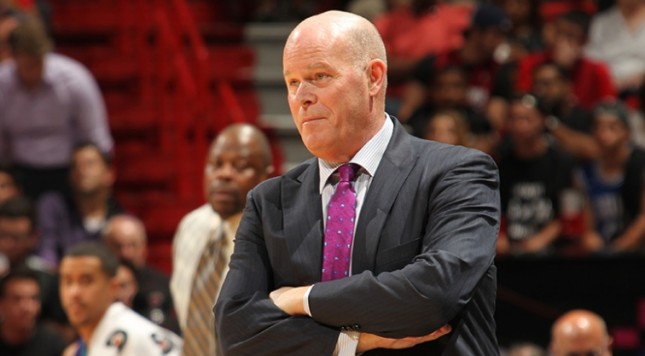You could choose to view Steve Clifford in a negative light after Game 2 of the Eastern Conference first-round series between his Charlotte Hornets and the Miami Heat.
More precisely, you could choose to negatively view both the quality of Clifford’s coaching, since his team is getting smoked. You could also choose to perceive Clifford’s extensive postgame remarks, shown below, as condescending and the product of insecurity.
Would you be wise to do so, however?
Here are the remarks:
Steve Clifford 4 2+ min. on why adjustments don't necessarily need to be made after allowing 238 points in 2 games: pic.twitter.com/1l9kAH9BtS
— John Schuhmann (@johnschuhmann) April 21, 2016
It is so easy for coaches and athletes to be stubborn, and more specifically, stubborn in a way which makes them appear to be behind the curve.
We see this most often in baseball, where a manager says, “Player X is my ninth-inning reliever. This is how we’ve always done it, so we’ll continue to do it that way.” Never mind if an opponent brings the heart of the order to the plate in the eighth, or if the game’s tipping-point situation occurs with the bases loaded and two out in the seventh — the manager has his way, and he’s going to stick to the way because… that’s the way.
Stubbornness can be a very bad look for a coach in any sport. If you’re reaffirming your own methods just because you don’t want to cede psychological turf — because it feels like a defeat if you have to change anything — you’re in the wrong line of work. Central methods — Plan A — have their place in competition, but there comes a time when a coach has to be ready to move to Plan B, and players must adjust accordingly.
We discussed this in a piece earlier in the week on shooting and attacking, noting that when jumpers don’t fall, players have to find their way to the free throw line.
After Game 2 of Hornets-Heat, in which Miami’s offense smoked Charlotte’s defense yet again, it’s perfectly reasonable to ask Steve Clifford about his defensive approach.
On the merits, though, is Clifford displaying the “bad stubbornness” described above, or is he on point with his comments?
Not only is he correct, but his comments — made specifically about his opponent’s offense — can very much apply to his own offense and, for that matter, the other teams which have struggled so profoundly in these 2016 playoffs.
If Miami’s Luol Deng hits 71 percent of his shots and over 54 percent of his threes, and while Justise Winslow hits 4 of 6 shots as he did in Game 2, the Heat — who have a huge matchup advantage with Dwyane Wade at the offensive end of the floor — simply aren’t going to be contained.
Realize this about the Heat: They were a genuinely bad perimeter shooting team for much of the season. If they had shot the ball well, they wouldn’t have felt the need to pick up Joe Johnson at the trade deadline. This team desperately needed shooting help.
Structurally, then, Clifford’s postgame sermon doesn’t seem to be an errant commentary on his team’s defense — it can be cleaned up, but Miami is hitting a lot of shots it didn’t hit in the regular season. This feeds into a larger discussion of both Hornets-Heat and the playoffs as a whole, with all eight series having completed two games at this point.
If Miami is receiving surprisingly good shooting in this series, Charlotte is shooting below its expectations. Kemba Walker was just 1 of 6 from 3-point range in Game 2. His development as a long-distance shooter has been central, not peripheral, to Charlotte’s development as a team. Alongside Walker, Marvin Williams — an important cog in the Hornets’ offense — has endured a disastrous two-game start to his postseason. Williams is 1 for 17 from the field. If he had made 5 of 10 shots in Game 2 instead of eating an 0-for-10 bagel, the contest might have been very different.
Clifford’s remarks about the difference between a player going 1 for 8 and 6 for 8 are entirely on point.
We’re seeing this not just in Charlotte-Miami, but around the playoffs.
Damian Lillard can’t hit shots for Portland against the Los Angeles Clippers, and the Blazers as a team aren’t getting nearly enough production from the three-point shot, as has been the case for the Hornets.
Jae Crowder can’t hit shots for Boston against Atlanta, and the Celtics are dying from the three-point line as well.
DeMar DeRozan can’t hit for Toronto against Indiana, and the inability of the Raptors’ backcourt to consistently hit perimeter shots certainly limits their options against the Pacers’ defense.
Kevin Durant remarkably wore a 7-for-33 albatross in Game 2 against Dallas. Had he gone 8 for 33, only one of the eight first-round series would be 1-1 through two games.
Look around the league. Evaluate the evidence.
As much as tactics and adjustments and Plan Bs are needed in coaching, this league often remains as simple as make-or-miss.
You could choose to view Steve Clifford and his comments in a negative light — that’s your right. It’s a free country.
You are free… to be wrong.


